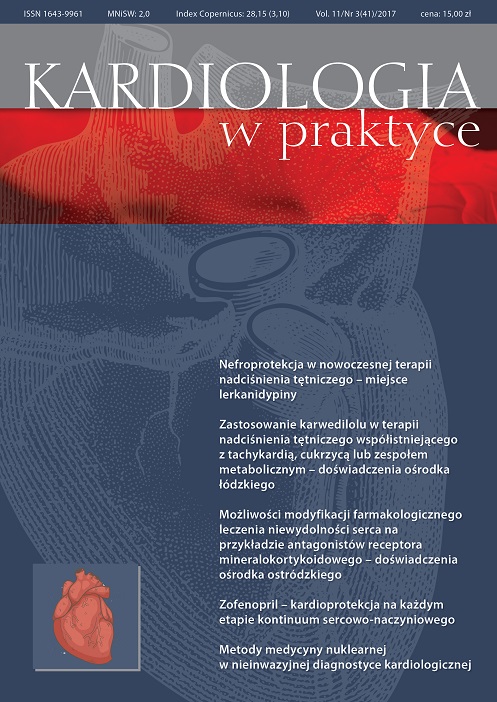Zofenopril – unique cardioprotection at every stage of the cardiovascular continuum Review article
Main Article Content
Abstract
Zofenopril is a lipophilic tissue inhibitor of angiotensin converting enzyme that, by having a sulfhydryl group, has beneficial effects on the endothelium, anti-inflammatory effects, increases local nitric oxide production and inhibits metabolic and haemodynamic myocardial ischaemia, which increases cardioprotection at every stage of cardiovascular continuum.
Downloads
Article Details

This work is licensed under a Creative Commons Attribution-NonCommercial 4.0 International License.
Copyright: © Medical Education sp. z o.o. This is an Open Access article distributed under the terms of the Attribution-NonCommercial 4.0 International (CC BY-NC 4.0). License (https://creativecommons.org/licenses/by-nc/4.0/), allowing third parties to copy and redistribute the material in any medium or format and to remix, transform, and build upon the material, provided the original work is properly cited and states its license.
Address reprint requests to: Medical Education, Marcin Kuźma (marcin.kuzma@mededu.pl)
References
2. Ranadive S.A., Chen A.X., Serajuddin A.T.M.: Relative lipophilicities and structural-pharmacological considerations of various angiotensin-converting enzyme (ACE) inhibitors. Pharm. Res. 1992; 9: 1480-1486.
3. Cushman D.W., Wang F.L., Fung W.C. et al.: Comparisons “in vitro”, “ex vivo”, and “in vivo” of the actions of seven structurally diverse inhibitors of angiotensin converting enzyme (ACE). Br. J. Clin. Pharmacol. 1989; 28: 115S-131S.
4. Cushman D.W., Wang F.L., Fung W.C. et al.: Differentiation of angiotensin-converting enzyme (ACE) inhibitors by their selective inhibition of ACE in physiologically important target organs. Am. J. Hypert. 1989; 2: 294-306.
5. DeForrest J.M., Waldron T.L., Krapcho J. et al.: Preclinical pharmacology of zofenopril, an inhibitor of angiotensin I converting enzyme. J. Cardiovasc. Pharmacol. 1989; 13: 887-894.
6. Mitchell G.F., Pfeffer M.A., Finn P.V., Pfeffer J.M.: Equipotent antihypertensive agents variously affect pulsatile hemodynamics and regression of cardiac hypertrophy in spontaneously hypertensive rats. Circulation 1996; 94: 2923-2929.
7. Farsang C.: Blood pressure control and response rates with zofenopril compared with amlodipine in hypertensive patients. Blood Press. Suppl. 2007; 2: 19-24.
8. Narkiewicz K.: Comparison of home and office blood pressure in hypertensive patients treated with zofenopril or losartan. Blood Press. Suppl. 2007; 2: 7-12.
9. Mallion J.M.: An evaluation of the initial and long-term antihypertensive efficacy of zofenopril compared with enalapril in mild to moderate hypertension. Blood Press. Suppl. 2007; 2: 13-18.
10. Borghi C., Cicero A.F.: Fixed combination of zofenopril plus hydrochlorothiazide in the management of hypertension: a review of available data. Vasc. Health Risk. Manag. 2006; 2(4): 341-349.
11. Brilla C.G.: Regression of myocardial fibrosis in hypertensive heart disease: diverse effects of various antihypertensive drugs. Cardiovasc. Res. 2000; 46(2): 324-331.
12. Evangelista S., Manzini S.: Antioxidant and cardioprotective properties of the sulphydryl angiotensin-converting enzyme inhibitor zofenopril. J. Int. Med. Res. 2005; 33: 42-54.
13. Liu X., Engelman R.M., Ronson J.A. et al.: Attenuation of myocardial reperfusion injury by sulfhydryl-containing angiotensin converting enzyme inhibitors. Cardiovasc. Drugs Ther. 1992; 6: 437-443.
14. Cominacini L., Pasini A., Garbin U. et al.: Zofenopril inhibits the expression of adhesion molecules on endothelial cells by reducing reactive oxygen species. Am. J. Hypertens. 2002; 15: 891-895.
15. Napoli C., Sica V., de Nigris F. et al.: Sulfhydryl angiotensin-converting enzyme inhibition induces sustained reduction of systemic oxidative stress and improves the nitric oxide pathway in patients with essential hypertension. Am. Heart J. 2004; 148(1): e5.
16. Brogelli L., Parenti A., Capaccioli S. et al.: The angiotensin converting enzyme inhibitor zofenoprilat prevents endothelial cell apoptosis and promotes coronary angiogenesis “in vitro”. FASEB J. 1999; 13: A528.
17. Ambrosioni E., Borghi C., Magnani B.: The Effect of the Angiotensin–Converting–Enzyme Inhibitor Zofenopril on Mortality and Morbidity after Anterior Myocardial Infarction. N. Engl. J. Med. 1995; 332: 80-85.
18. Borghi C., Ambrosioni E.: Survival of Myocardial Infarction Long-term Evaluation-2 Working Party. Double-blind comparison between zofenopril and lisinopril in patients with acute myocardial infarction: results of the Survival of Myocardial Infarction Long-term Evaluation-2 (SMILE-2) study. Am. Heart J. 2003; 145(1): 80-87.
19. Borghi C., Ambrosioni E.: Survival of Myocardial Infarction Long-term Evaluation Study Group. Effects of zofenopril on myocardial ischemia in post-myocardial infarction patients with preserved left ventricular function: the Survival of Myocardial Infarction Long-term Evaluation (SMILE)-ISCHEMIA study. Am. Heart J. 2007; 153(3): 445.e7-14.
20. del Corso F., Pareo I., Borghi C.: Evolving concept of cardioprotection in myocardial infarction: from SMILE-1 to SMILE-5. Kardiol. Pol. 2013; 71(7): 667-674.
21. Tykarski A., Narkiewicz K., Gaciong Z.: Zasady postępowania w nadciśnieniu tętniczym – 2015 rok. Nadciśnienie Tętnicze w Praktyce 2015; 1: 1-70.

